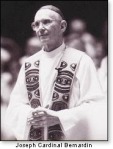As the dust settles on the election of  Archbishop Dolan as the USCCB’s new President and the defeat of Bishop Kicanas, since the name of Cardinal Bernardin was resurrected in many of the media reports, we thought we’d just make sure everyone knew the ties that connect Fr. Hehir, the late Cardinal Bernardin, and Bishop Kicanas.
Archbishop Dolan as the USCCB’s new President and the defeat of Bishop Kicanas, since the name of Cardinal Bernardin was resurrected in many of the media reports, we thought we’d just make sure everyone knew the ties that connect Fr. Hehir, the late Cardinal Bernardin, and Bishop Kicanas.
In the course of writing this, we stumbled across some articles about Bernardin that were, er, rather controversial and disturbing as relates to the advancement of the gay agenda and sub-culture in the Catholic Church by Bernardin. Grab a good strong cup of coffee or tea. You’ll need it today.
Kicanas Connection to Bernardin
USA Today said about Kicanas:
The expected choice: the Bishop of Tucson Gerald Kicanas, a Chicago-born and trained bishop mentored by the late Cardinal Joseph Bernardin who was known as a voice for social justice in the era when the U.S.Conference of Catholic Bishops wrote major pastoral letters nuclear weapons, the economy and AIDS. In 2008, Kicanas won The Cardinal Bernardin Award for his commitment to finding common ground within the Catholic faith.
Bernardin’s pastoral letter on AIDS talked about public education campaigns that could give out information about condoms, and it was later modified after objections by Cardinal Law, Cardinal O’Connor, and Cardinal Ratzinger becuase some of its passages went against Church teachings or appeared to condone immoral behavior.
Bernardin was mentioned as the model for a potential Kicanas USCCB presidency very frequently; just do a Google search on kicanas and bernardin and you’ll find 2700 results.
Kicanas Connection to Hehir
Since Kicanas was a protégé of Bernardin’s and Fr. Hehir was close to Bernardin too, it only makes sense that Kicanas would probably have some connection to Fr. Hehir. Here is Bishop Kicanas speaking at the National Leadership Roundtable, where Fr. Bryan Hehir is on the Board of Directors along with Sr. Carol Keehan of the CHA, whom Hehir praised earlier for her leadership in supporting the abortion-funding ObamaCare. (We wrote about that in Fr. Bryan Hehir “Wounds Catholic Unity” by Undermining U.S. Bishops on Healthcare).
Like most of the other organizations that Fr. Hehir is a member of, the National Leadership Roundtable is not without controversy:
“Bishops who might welcome the help offered by the Roundtable project in its early phases may later find that those who only wanted to be of assistance have effectively taken over a large part of the decision-making authority traditionally belonging to the episcopal office,” Fr. Richard Neuhaus, an influential New York archdiocesan priest wrote in First Things, the monthly journal he founded. “He who pays the piper, and all that,” wrote Neuhaus. “An additional concern expressed by lay critics of the Roundtable project is that it would create a small elite of wealthy lay people and progressive activists falsely claiming to represent the millions of lay faithful,” continued Neuhaus. “In response to this concern, it is said that the Boisi group is only taking the initiative in a restructuring of the governance of the Catholic church that will, in its successive phases, expand to include democratically elected representation at every level of the church’s life.”
Practical assistance is just what the Roundtable offered the Tucson, Ariz., diocese, which is undergoing significant management challenges in the wake of bankruptcy proceedings that led to separate incorporation of the church’s 74 parishes.
Hehir Connection to Bernardin
As we told you in “Fr. Hehir and the Seamless Garment,” Fr. Hehir and the late Cardinal Bernardin were close collaborators and friends. From the 2001 book, “Religious Leaders and Faith-Based Politics” we hear:
Shortly after the pastoral on war and peace had been issued. and no doubt trying to take advantage of the momentum it bad generated within the hierarchy. Cardinal Bernardin undertook another major initiative intended to broaden the bishops’ pro-life agenda beyond abortion.
As one would expect, in undertaking this initiative Bernardin received the invaluable assistance of Bryan Hehir. Indeed it is fair to say that this initiative was chiefly the product of their long collaboration. After working together over the years, the two men had become close friends.
Bernardin Connection to Gay Agenda and Sub-Culture in the Catholic Church
If what’s documented in these various books and articles is accurate, our calling this Cardinal Bernardin’s “connection to gay agenda and sub-culture” is an understatement already. 
- From Paul Melanson at Lasalette Journey, excerpting from Paul Likoudis’s “AmChurch Comes Out: The U.S. Bishops, Pedophile Scandals and the Homosexual Agenda”:
If the problem of a homosexual network in the Church is viewed in this larger perspective, one can understand more fully the remarkable role of Joseph Cardinal Bernardin in creating an ‘American Church’ that has become a trusted ally of all those various social, political and cultural forces promoting sexual libertinism…Bernardin, it must be recalled, at least briefly, was sponsored, tutored and promoted by a number of dubious characters, not only his clerical godfather and mentor, Archbishop Paul Hallinan of Atlanta, who served as a bishop in Bernardin’s hometown, Charleston. Bernardin’s other ‘godfather’ was Archbishop (later Cardinal) John Dearden, who would be responsible for the appointment of such notorious pro-homosexual bishops as Detroit Auxiliary Tom Gumbleton, Ken Untener of Saginaw, Joseph Imesch, of Joliet, and Springfield’s Daniel Ryan….His closest friend from his South Carolina days, Monsignor Frederick Hopwood, had been accused of abusing hundreds of boys dating back to the early 1950s, when he and Bernardin shared a residence at the Cathedral of St. John the Baptist in Charleston – where some of the alleged abuse took place….
- The following are excerpts from Randy Engel’s book The Rite of Sodomy: Homosexuality and the Roman Catholic Church published in a column by Matt Abbott entitled “Remembering Joseph Cardinal Bernardin“The Special Case of Joseph Cardinal Bernardin
To do real justice to Cardinal Bernardin and his entourage of clerical homosexuals and pederasts and ancillary hangers-on who made up the Chicago-Washington, D. C. Homosexual/Pederast Axis would require more than one full size book.
That Bernardin’s alleged sexual penchant for young men still remains an open issue even today, ten years after the cardinal’s death, is reflected in the remarks made by writer A. W. Richard Sipe in his keynote address, “View From the Eye of the Storm,” given on February 23, 2003 to the Linkup National Conference in Louisville, Ky.
According to Sipe, years before Bernardin was charged with sexual abuse by Steven Cook in 1993, “several priests who were associates of Bernardin prior to his move to Chicago revealed that they had ‘partied’ together; they talked about their visits to the Josephinum to socialize with seminarians.”
It is a fact that Bernardin’s accuser (Cook) did not ever retract his allegations of abuse by anyone’s account other than Bernardin’s,” said Sipe. He also told the audience that the Chicago Archdiocese’s pay off to Cook before he died of AIDS was in the $3 million range.
The massive reorganization of the old National Catholic Welfare Conference into the super bureaucracy of the NCCB/USCC proved to be an unbelievable boon to the Homosexual Collective within and without of the Church. It accelerated the rate of wholesale infiltration and colonization of dioceses throughout the United States and reached its zenith under the reign of Pope Paul VI.
One of Bishop Bernardin’s closest friends at the NCCB/USCC was fellow homosexual Father James S. Rausch whose background has been thoroughly covered in Chapter 11. In 1970, Bishop Bernardin appointed Father Rausch, Assistant General Secretary of the NCCB/USCC. After Bernardin was made Archbishop of Cincinnati in November 1972, Rausch succeeded him as General Secretary.
Rausch was consecrated an Auxiliary Bishop of St. Cloud, Minn. by Cardinal John Krol of Philadelphia on April 26, 1973. In January 1977, having served out his term of office at the NCCB/USCC, Rausch was made Bishop of the Diocese of Phoenix.
An up and coming prelate to whom Bernardin was especially attached was Auxiliary Bishop John Roach who later became the Archbishop of Saint Paul and Minneapolis. Roach served as President of the NCCB/USCC from 1980 to 1983.
Bernardin and Roach, who some AmChurch observers characterized as “conjoined twins,” dominated political life at the NCCB/USCC for decades, first directly, and later through the clerics they advanced to bishoprics and key positions within the American bishops’ bureaucracy. The two men were frequent traveling companions and cooperated on a number of important NCCB documents including the 1983 Pastoral Letter “The Challenge of Peace: God’s Promise and Our Response” that challenged the morality of nuclear deterrence.
“The Boys Club” Murder
On May 30, 1984, Frank Pellegrini, the organist and choir director for All Saints — St. Anthony of Padua Roman Catholic Church on Chicago’s Southside was found brutally murdered in his apartment. His hands had been tied with barbed wire and he had been stabbed more than 20 times. There was no sign of forced entry. Police officials investigating the case believed that the murder was committed either by a woman or a homosexual.
According to his girlfriend, Pellegrini had had a homosexual relationship with a Chicago priest and was part of a secret clerical “Boys Club” that not only included homosexual assignations, but also ritualistic, occult worship and the sexual abuse of young boys garnered from low income ethnic families in the city. Pellegrini’s girlfriend told the police that Frank had told her that he wanted out of the Club and had scheduled a meeting with Chancery officials on the matter shortly before his death.
Two young private Chicago investigators, Bill Callaghan and Hank Adema, were hired to look into the Pellegrini murder. They were able to confirm the existence of a clerical homosexual/pederast ring operating out of the Archdiocese of Chicago. It appeared that the alleged homosexual ring they had uncovered was the same one mentioned by Father Andrew Greeley in the paperback version of Furthermore! Memories of a Parish Priest written in 1999.
One of the puzzling mysteries surrounding the murder involved Cardinal Bernardin. According to the police who were present at the crime scene, shortly after Pellegrini’s body was discovered, Cardinal Bernardin arrived at the murdered man’s home to quiz the officers about the killing. The cardinal told police that he did not know the murdered man. This raises the obvious question of how he learned of the killing so quickly and of what special interest was Pellegrini to him since he did not know the victim. The Pellegrini case was reopened in the early 1990s, but to date, the crime remains unsolved and Father Greeley remains silent.
Bernardin and the Winona Seminary Scandal
Although the homosexual scandal at Immaculate Heart of Mary Seminary in Winona, Minn. has already been covered in the previous chapter in connection with Bishop Brom of San Diego, it may be helpful to recall the case again briefly as Archbishop Bernardin was implicated in both the scandal and the subsequent payoff, and because it ties into the well-publicized Cook Affair.
As reported earlier, the details of the Winona scandal did not come to public attention until 2002. However, it had its genesis in the 1980s when a small group of homosexual prelates decided to scout out fresh meat from candidates for the priesthood at Immaculate Heart Seminary in the Diocese of Winona.
According to reports based on an investigation by Roman Catholic Faithful, the bishops involved in the sordid affair were alleged to be Joseph Bernardin, John Roach, Robert Brom, and a fourth bishop whose identity is not known. (The Boston Globe briefly mentioned the scandal here)
At least two of the seminarians who were assaulted at Immaculate Heart Seminary took legal action, and it was through them that the existence of the predatory homosexual ring of bishops in Winona came to light.
One of the seminarians indicated that some of the homosexual activities at the seminary were connected to occult and Satanic rituals. He and other seminarians also mentioned that on occasion Archbishop Bernardin arrived at the seminary with a young traveling companion, Steven Cook. Years later, Cook gained worldwide notoriety as the man who accused Cardinal Bernardin of sex abuse in the late 1970s when Bernardin was Archbishop of Cincinnati.
Endnote 26:
Cardinal Bernardin’s “Seamless Garment” later renamed the “Consistent Life Ethic,” like “The Many Faces of AIDS,” is another illustration of how Bernardin helped to advance the agenda of the Homosexual Collective. The Seamless Garment strategy set out by Bernardin in the 1980s sought to broaden the pro-life tent by expanding the movement’s opposition to abortion, euthanasia, population control and school sex instruction to include other “social justice” issues such as war and peace, opposition to the death penalty, welfare reform and civil liberties. One of the immediate effects of the Seamless Garment ethic was the increase of power and financial resources of Social Justice offices at the diocesan level where the Homosexual Collective has always been strongly represented.
Since the Homosexual Collective has been extremely successful at framing the homosexual question in terms of a “civil rights” issue, the Bernardin strategy opened the NCCB/USCC and diocesan Social Justice Departments (and their considerable resources and manpower) to further exploitation by the Collective. At the same time the Collective benefited from the neutering effect the Seamless Garment strategy had on pro-life/pro-family forces within the Church that had become the backbone of public opposition to the political and social agenda of the Homosexual Collective. The Bernardin strategy served to breathe new life into the languishing Democratic Party and its pro-homosexual platform as well as promote the “big tent” inclusive policies of the Republican Party that sought to capitalize and exploit the political talents and financial wealth of the Homosexual Collective in America.
- From New Oxford Review’s 2004 “Why Won’t Our Bishops Solve the ‘Gay’ Priest Problem“?
You may remember the name of Joseph Kellenyi. He figured in Michael S. Rose’s book Goodbye, Good Men, and in two of Rose’s articles in the NOR (Dec. 2002 and June 2003). Kellenyi, who was once a seminarian at Mundelein in the Chicago area, makes the following statement about a conversation he had with the Rev. John F. Canary, the Rector of Mundelein Seminary, in August 1999: “I told Rev. Canary that I had some problems with the Chicago Diocese. I told him that I perceived that while Cardinal Bernardin had probably lived a celibate life, and may not have abused Steven Cook, that he also was flamingly gay. I said that I perceived that under Bernardin’s regime, Chicago had become like Santa Rosa under Bishop Ziemann. I said that in Santa Rosa, those priests and seminarians not in the bishop’s gay clique were treated unjustly, and that the same was true of Chicago under Bernardin. I said that I perceived that Bernardin fostered and promoted a network of gay priests and bishops, and that they protected each other, covered up each other’s ‘mistakes,’ and promoted one another to positions of responsibility in Chicago and the church at large. I alluded to the fact that Bernardin had appointed Rev. Canary, and that he in turn had appointed the formation faculty. Rev. Canary’s response was ‘Your perception is accurate. The question is what are you going to do about it.’”
Do we have a smoking gun here? Kellenyi thinks so. In the same issue of AMDG, Kellenyi has an article detailing his story. Says he: “The polygraph results show that I discovered in 1999 that Cardinal Bernardin had fostered a network of gay priests and bishops who were covering up one another’s sexual indiscretions. The rector of Mundelein Seminary confirmed this fact.…Andrew Greeley has insinuated that Bernardin was gay. Will he now come out and simply admit that he knew it all along?”
In Paul Likoudis’s book Amchurch Comes Out: The U.S. Bishops, Pedophile Scandals and the Homosexual Agenda, Likoudis fingers Cardinal Berdanin as the “bishop-maker who…gave the American hierarchy its pronounced pro-gay orientation.…Bernardin acquired power rapidly. As his friends back in Charleston continued buggering little boys, Bernardin used his influence, starting in 1968, as General Secretary of the U.S. Catholic Conference, to select bishops (many of whom are still ordinaries) who would, to put it charitably, condone and promote homosexuality as an acceptable lifestyle and tolerate the sexual abuse of children by priests.”
A telling aside: James Hitchcock reported that “the Windy City Gay Men’s Chorus was asked [by Bernardin, who knew he was dying] to sing at his wake in the Cathedral. The chorus’s director said that they regarded the invitation as a sign of approval by the Church…” (The Catholic World Report, Feb, 1997). Approval indeed! At least by Bernardin. The Gay Chorus performed six songs – in the sanctuary to the right of the altar.
Back to Kellenyi’s article. Says he: “I would urge the reader to search The New York Times archives for an article entitled ‘Can this Man Save the Catholic Church?’ The article is about Wilton Gregory [President of the U.S. Conference of Catholic Bishops], and in it he describes in detail how Bernardin mentored and handpicked him, grooming him from early on for a leadership position….One can reasonably presume that Bishop Gregory is well aware of the fact that he is where he is today because a gay Cardinal took a special interest in him at a young age. Bishop Gregory has benefited directly from the combination of homosexuality and power in the Church. This alone would explain his waffling over the gay priest problem.”
Well, yes it would. Meanwhile, we wait and wait to see if Rome will intervene and clean up the mess. (We’re not holding our breath.)
[Update: we have removed a link to an article from a source which we just learnd has been discredited.]
Bryan Hehir Exposed thought this would probaby be enough about all these guys for one post. Even beyond the issues of Kicanas’ judgment about seminarian Daniel McCormack documented in this post, since Bernardin was a mentor for Kicanas, and Kicanas was endorsed by the militant “Catholic” GLBT Rainbow Sash organization that disrupts Catholic Masses and thought Kicanas would be open and understanding to their views, we’re pretty pleased that Kicanas was defeated.
Lest we lose sight of the namesake of this blog in the midst of all of the Bernardin material, we remind you that this generally flattering chapter about Fr. Hehir in the book “Religious Leaders and Faith-Based Politics”–whose content drew from interviews with Fr. Hehir and many of his friends and collaborators–said about Hehir and Bernardin, “After working together over the years, the two men had become close friends.” (p. 214)
Hehir and Bernardin were long-time collaborators and close friends. Hehir is viewed by Cardinal Sean O’Malley as a highly trusted “strategic advisor.” Need we say more about the questionable judgement of the key people highlighted in this post when it comes to choosing their friends, collaborators, mentors, and advisors?







